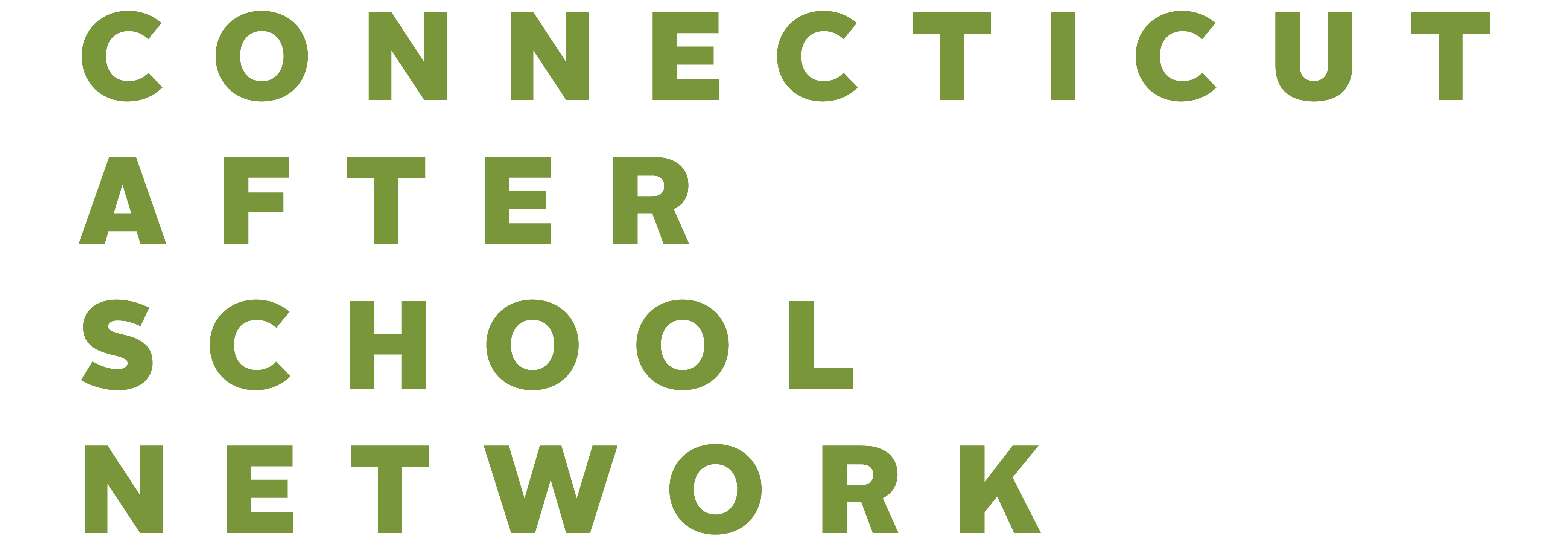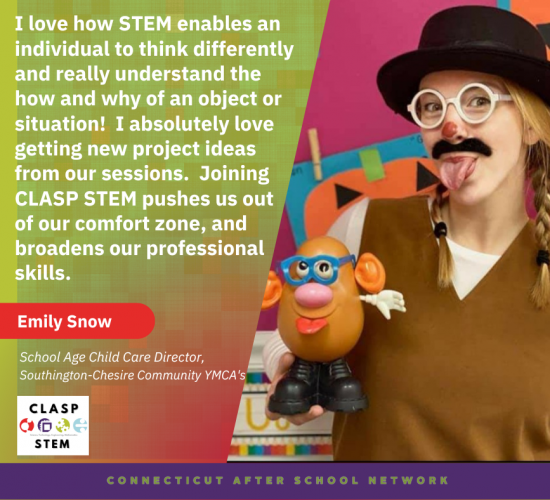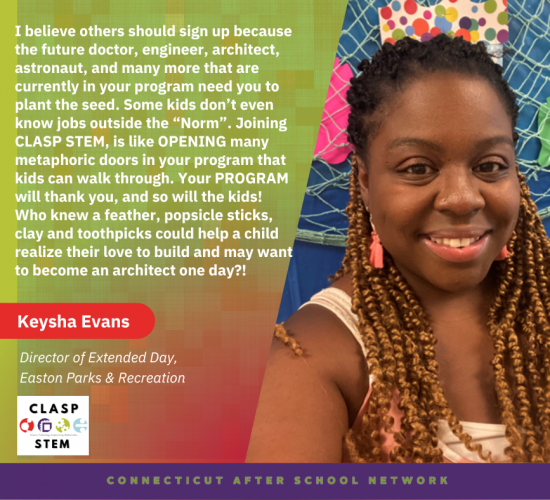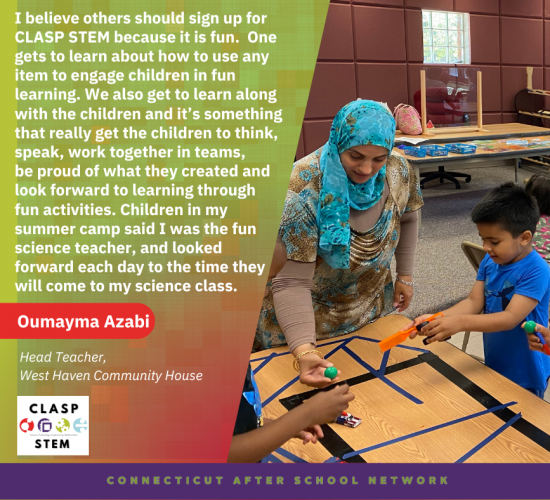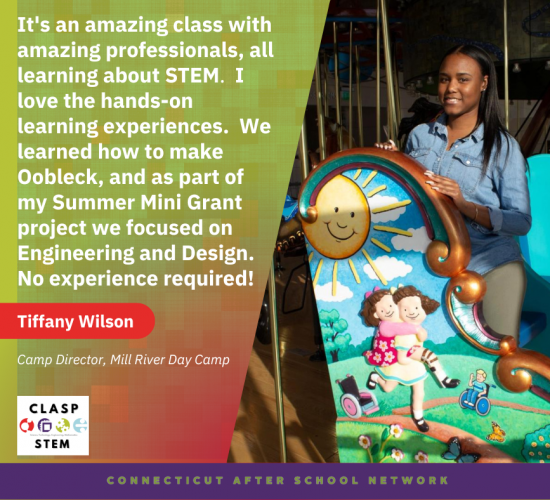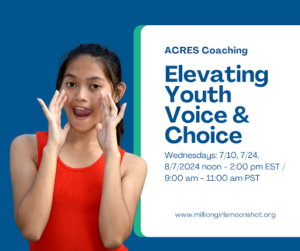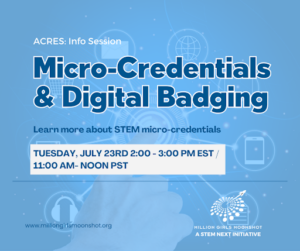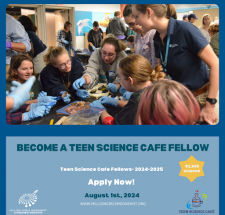Sign up for our Quarterly STEM Newsletter here.
NEXT ISSUE: SEPTEMBER 2024
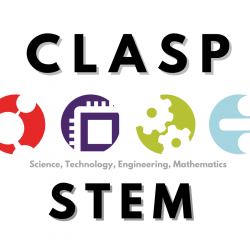
Our CLASP STEM Cohort allows out of school time professionals an excellent place to explore fun, unique STEM practices and opportunities for young people. The program connects realistic, relevant and hands-on learning and networking opportunities for you as an educator to add to your resources, practices and tools that will help you build opportunities for supporting the young learners in your programs to find the possibilities and skills that come from powerful learning experiences and thoughtful partnerships.
Our new CLASP STEM cohort began earlier this year. The cohort is getting ready to write their 2024 grant proposals for their summer camp programs. They already visited places like Eli Whiteney Museum and Sacred Heart University’s planetarium.
See what our participants have to say about their CLASP experience.
Monthly Padlets
PROFESSIONAL DEVELOPMENT
The expectation is that you will be live at all three sessions and an active member of this coaching cohort. Recordings are not available if you are unable to attend.
JUL 7, 22 & AUG 5
2:00 – 4:00 PM
Questions begin a path toward discovery, imagination, and STEM exploration. How can we help youth expand and clarify their thinking and develop their reasoning through the questions we ask them? This module is a great way to train staff on how to facilitate STEM learning. Experienced educators also love being part of a cohort as a way to connect with other educators across the country, to learn new lesson plans, and to reflect on practice. This is our introductory module and a prerequisite to other opportunities. *The expectation is that you will be live at all three sessions and an active member of this coaching cohort. Recordings are not available if you are unable to attend.
Register Here
Code: AC357PQ
(Coach Becky T)
JUL 10, JUL 24 & AUG 7
12:00 – 2:00 PM
How often do youth in your program get to choose what they’re investigating or designing, the materials they might use and/or how they engage with the work? In this module, participants try out strategies for elevating youth voice and choice and apply the ideas as they redesign a STEM activity to incorporate a greater variety of youth input. *The expectation is that you will be live at all three sessions and an active member of this coaching cohort. Recordings are not available if you are unable to attend.
Register Here
Code: AC356VC
(Coach Becky T)
JUL 23
2:00 – 3:00 PM
ACRES is excited to offer additional Information Sessions about STEM micro-credentials, which are competency-based, digital badges for afterschool and out-of-school professionals offered through the National Afterschool Association. You will learn about what Micro-credentials are and how to apply for them.
Please fill out this form, choose the date that works best for you, and we’ll reach out to you with the Zoom link.
APPLY BY AUG 1
The Teen Science Cafe (TSC) Fellows initiative is a ten-month training program designed to help informal educators implement Teen Science Cafes in their community. Teen Science Cafe Fellows receive one-on-one support from TSC Guides to launch a cafe program and host three cafe events during the year. Fellows receive a $2,500 stipend to support their work! Applications are now open.
The expectation is that you will be live at all three sessions and an active member of this coaching cohort. Recordings are not available if you are unable to attend.
Projects & Activities
Moon Day Month
July 20 is National Moon Day, and it’s one of the most historical days in human history. But what exactly do we celebrate on this day? Well, we’re celebrating the first time that humankind stepped foot on the Moon. An event that made history back on July 20, 1969, when astronauts Neil Armstrong and Buzz Aldrin became the first humans to step foot on our lunar satellite.
#MoonDay #NASA #STEMEducation #SpaceExploration
Brain Day
People around the world celebrate World Brain Day on July 22 of every year. This is one of the most important annual celebrations in the world, as it helps raise awareness on an increasingly significant health issue, especially in our modern age. Brain health can refer to many prevention methods designed to help preserve both mental health and brain neurological health. As people have become increasingly more vulnerable to neurological issues, raising awareness of the issue is as important.
Monthly Activities
- Landing Humans on the Moon: Over half a century ago, on July 20, 1969, humans walked on the Moon for the first time. Take a look back at the legacy of our first small steps on the Moon and look forward to the next giant leap with the following playlist for program providers, facilitators and families.
- Lunar Roving Vehicle Activity: In this activity, students compare lunar rovers to family cars, and then design and build a rover model that may be used to explore the moon. Special considerations for the vehicle include the type of terrain the rover will traverse.
- Rocket Races: In this fun activity students construct balloon-powered racing cars using a foam tray and drinking straws. They test the cars along a measured track on the floor. After measuring trials they report on their racer design and how it performed.
- Can Humans Recognize AI-Generated Images?: (this one requires a printer and a camera/smartphone) Artificial intelligence (AI) generated images have exploded in popularity, bringing plenty of controversy along with them. An AI-generated image of a tiger or a flower might seem harmless, but artificial images of people or events can contribute to “fake news.” In this science project youth investigate whether people can tell the difference between real pictures and pictures generated by AI.
other resources
- Simply STEM – December
- DEI Bytes – The Alliance for Identity Inclusive Computing Education’s “DEI Bytes” lesson series on YouTube focuses on developing equitable teaching skills for CS education, including topics on ableism, unconscious bias, and computing access.
- Simply STEM – November
- Simply STEM – October
- Simply STEM – September
- NGCP Blog – Supporting Space STEM Education: Resources to Spark Curiosity and Inspire STEM Learning – This blog post shares a list of resources put together based on NGCP’s experience at the National Space Council’s Space STEM Forum along with the ongoing work of NGCP supporting gender equity in STEM.
- NGCP Blog – Picture Books to Break Stereotypes in STEM (and Beyond!) – Find a list (with links) to the best STEM picture books for young learners featuring diverse characters and girl-centered stories.
- Simply STEM – August
- Simply STEM – July
- Simply STEM – June
- Simply STEM – May
- Simply STEM – April
- DNA Day
- Building a Community for Indigenous Mathematicians – Easy to read article on identifying as an indigenous mathematician and how to become part of a community of mathematicians.
- Three Ways Educators Can Shift the Way They Talk About Science – Blog post with simple suggestions for educators based on research conducted by Amanda Cardarelli at NYU.
- Simply STEM – March
- Simply STEM – February
- Simply STEM – January
- ‘I’m not just a mom’: Parents as creators, collaborators, and learners in creative computing
- National STEM Day
Look Up – August
Look Up – July
Look Up – June
Look Up – May
Look Up – April
- Maryland Out of School Time College and Career Readiness Toolkit: This is a comprehensive guide to help middle and high school out-of-school-time programs get laser focused on building 21st century skills and supporting young people as they navigate through the complex world of planning for their advanced education and careers. We will be adding free and low cost professional development resources including videos, online courses and opportunities for live virtual training. Want to help MOST spread the word? Use the Social Media Sharing Resources to spread the word.
- College and Career Readiness Middle School Playlist: This playlist is designed for middle school audiences focused on the College & Career Readiness Toolkit developed by the Maryland Out of School Time Network. This playlist distills the CCR Toolkit information into an actionable sequence for out-of-school time practitioners to implement with youth in their program. The Playlist consists of eight (8) 60-90 minute sessions aimed at middle school youth and one (1) session of pre-work for practitioners and organizational leaders only. Check out the accompanying CCR Middle School Playlist Youth Workbook.
- Building the STEM Workforce: Quickstart Toolkit: This Quickstart Toolkit outlines strategies for short-term changes that can help libraries accelerate their progress as STEM equity leaders — no matter how far they’ve already progressed in that journey.
- The Strategic Imperative of STEM Education in Workforce Development: In the ever-evolving landscape of workforce development, professionals are faced with the critical task of preparing individuals for success in an increasingly complex and competitive job market. This article explores the profound impact of STEM education on workforce development and provides real-world examples that underscore its transformative potential.
- Great Career Exploration Resources from Illumina and Verizon Partners
- Career Girls – A comprehensive video-based career exploration tool for girls featuring diverse women STEM role models. It’s free to use and contains 16,000 videos, as well as career quizzes and resources.
- Engineering Mindsets/Computer Science: AI 101 for Teachers – This is a free, foundational online learning series for educators interested in AI. The series features lessons from Code.org, ETS, ISTE and Khan Academy to demystify AI, explore responsible implementation, address bias, and showcase how AI-powered learning can revolutionize.
- Engineering Mindsets/Computer Science: Teach Computer Science & Coding to Kids – This Google sponsored site supports educators to engage youth in coding activities. It’s free, fun, and no computer science experience is required. The lessons are video based and cover a variety of subjects.
- FabFems – A collection of resources for role models, educators, and parents to inspire and educate girls about science, computer science, technology, engineering, and mathematics courses and careers. The website includes Resources for Role Models and Resources for Girls.
- Million Womens Mentors – MWM is the premier network dedicated to encouraging girls and women around the world to pursue, persists, and succeed in STEM careers.
- National Mentoring Resource Center – A collection of mentoring resources including handbooks, curricula, manuals, and other resources that practitioners can use to implement and further develop program practices.
- Techbridge Role Model Training and Resources – These resources are for adult or near-peer role models to develop skills for engaging girls and historically excluded youth in STEM through guides, videos, and questions.
- Access to STEM Framework: To improve the overall quality of out-of-school STEM programs, we need to address how program providers design and implement programming to increase access in STEM for youth who have been underrepresented in the STEM fields. Partnering with the National Girls Collaborative Project (NGCP) and national experts, we have developed an Access to STEM Framework — a guide for supporting program providers in this transformation. Download the Framework.
- Equity in Education: Evidence Based Strategies: Equity in education has become a common goal and guiding principle for modern school improvement and education reform efforts in the United States. But what does equity in education truly mean and how can it be achieved? This resource center is a one stop shop to help leaders and practitioners define exactly what is meant by “equity in education” vs. equality and materials to support youth and families.
- Women at NASA: Women have always played a critical role in NASA’s history. From the first black female engineer to the first female astronaut—many of our female pioneers have been the “first” to achieve something monumental in their fields. Today, the women of NASA continue to lead and inspire in science, technology, engineering and mathematics (STEM) and truly make an impact on society. As we look ahead, we know it will take a diverse workforce to achieve our ambitious goals—like putting the first woman and first person of color on the Moon. NASA is committed to recruiting and retaining women in STEM to help the agency continue to push boundaries to achieve the impossible.
- Partnering with Multilingual Families: Engaging with families of students who are learning English is a powerful lever for fostering academic success and overall student well-being. The Ohio Afterschool Network has outlined effective strategies for engaging with families of english language learners in STEM.
- STEM Kits & Supplies – Browse our Padlet list.
- Click2Science (click2sciencepd.org)
- CT Million Women Mentors
- Earth Day Education – Browse resources to guide your environmental education lessons and stewardship activities on Earth Day and throughout the year. These resources can be adapted to a variety of ages and settings.
- Educator Guide: Educator Guide: STEM Activities for Families | NASA/JPL Edu Easy to implement engaging activities for families (as a follow up to after school activities.)
- Exploring Paleontology to Spark Science Engagement from a Young Age – Learn how to nurture your students’ interest in dinosaurs and increase science engagement beginning in elementary school in this webinar recording. Hear from Dr. Holly Woodward Ballard, an Associate Professor of Anatomy and Paleontology at the Oklahoma State University Center for Health Sciences, and PK-5th grade teacher Alyssa Barr who shares tips on how to use a book like Lily and Maia to fuel an integrated learning experience. This webinar also featured Audrey O’Connell, co-founder of HSG, who shared the process of developing the Lily and Maia characters and working with the young artist, Grace Hattrup, to ensure scientific accuracy of the paleo elements.
- Girls Rock in Science & Math
- Innovation Play
- KinderLab Robotics – If you’re looking to add coding, robotics, and STEAM to your afterschool or OST programs, chose KIBO!
- Museum of Science – Educator resources, activities and more!
- National Inventors Hall of Fame
- The National Center for Quality Afterschool – Math in Afterschool – The National Partnership for Quality Afterschool Learning developed professional development guides for four content areas of the toolkit: literacy, math, technology, and the arts.
- National Geographic – Bring National Geographic to your classroom through lesson plans, maps, and reference resources.
- PBS Kids Protecting Our Planet Resources – Earth day games, crafts, printables, and other resources for kids ages 2-5 from PBS Kids.
- Room to Read STEAM Powered Careers Collection – Room to Read’s STEAM-Powered Careers collection presents 10 Science, Technology, Engineering and Mathematics-themed books to inspire first through third graders about the wide variety of groundbreaking and exciting STEAM careers that they can start exploring right now.
- Scratch – The world’s largest coding community for children and free coding language designed for children ages 8+. With a simple visual interface, Scratch easily allows young people to create digital stories, games, and animations.
- ScratchJr – A free application for young children (ages 5-7) to get their first introduction to coding. With ScratchJr, children code their own interactive stories and games. In the process, they learn to solve problems, design projects, and express themselves creatively on the computer.
- State of Girls and Women in STEM – This updated NGCP resource presents a high-level summary of the most compelling statistics and research on the state of girls and women in STEM, focused on K-12 Education, Higher Education, and the STEM Workforce. The report highlights the impacts of intersectional inequalities, as Latina, Black, and Indigenous women represent less than 10% of the STEM workforce. A toolkit with graphics of these statistics and research is available to use in social media and presentations.
- STEMfinity
- Tech Terra Education – STEM in a Box
- Teq.com – Explore the technology, tools, and instructional solutions that bring all of the dynamic moving parts of education together into the complete thought.
- You For Youth // Computer Science for All — Computer Not Required — This 21CCLC resources covers it all—activities, curricula, fact sheets. There’s information for practitioners, parents, and families. The ready-to-use resources for educators have links to everything including a variety of curricula for k-12 students and recommendations for best practice.

GIRL SCOUTS STEM PLAYBOOK
The world of STEM is filled with endless opportunities to make a difference. From exploring computer coding and space exploration to building robots and solutions to problems such as climate change, girls are using STEM as a tool to change our world.
Whether you’re involved with Girl Scouts or simply a supportive adult, the new STEM Playbook offers ideas, guidance, and access to resources and tools to grow girls’ interest and skills in the field. Discover new ideas to help girls build the future with STEM.
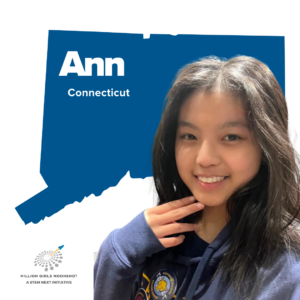
2024 FLIGHT CREW AMBASSADOR
Ann, Farmington, CT.
Ann is interested in pursuing a career as a robotics software engineer with a focus on machine learning in computer vision.
Ann enjoyed doing similar work on the FIRST Robotics Team where Ann used machine learning to program the robot to identify game pieces on the field.
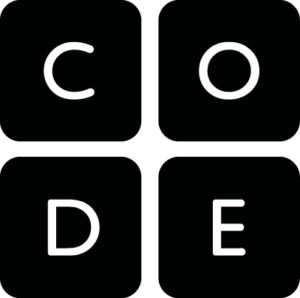 Organized by Code.org, the annual Hour of Code campaign is a global movement in 180+ countries that introduces young people to computer science through fun, age-appropriate learning activities. The Moonshot’s partnership with Code.org aims to expand that reach into afterschool.
Organized by Code.org, the annual Hour of Code campaign is a global movement in 180+ countries that introduces young people to computer science through fun, age-appropriate learning activities. The Moonshot’s partnership with Code.org aims to expand that reach into afterschool.
Learn more about the Hour of Code, download the Afterschool Guide for Hour of Code to explore activities and tutorials, and encourage programs to register as an official Hour of Code site to globally engage and take advantage of the full Hour of Code experience.
The CT After School Network is proud to be a part of the Million Girls Moonshot initiative, working to inspire and prepare the next generation of innovators by engaging one million more girls in STEM learning opportunities through afterschool and summer programs.
The Million Girls Moonshot will not only allow girls to envision themselves as future innovators, but it will increase the quality of out-of-school STEM learning opportunities for all young people, particularly underserved and underrepresented youth.
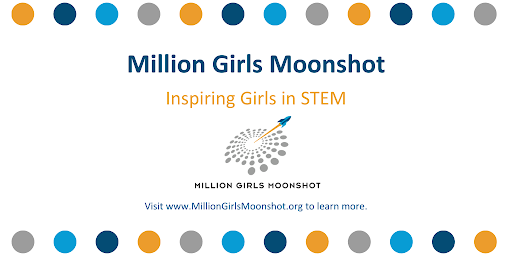
About the Million Girls Moonshot
The Moonshot is designed to spur girls’ interest, understanding, and confidence in STEM and equip them to become problem solvers with an engineering mindset. Led nationally by the STEM Next Opportunity Fund and the Charles Stewart Mott Foundation in partnership with the Intel Foundation and the Gordon and Betty Moore Foundation, the Million Girls Moonshot:
- Leverages afterschool networks in all 50 states to help school-age girls access high-quality STEM education, support, and mentors.
- Uses an equity and inclusion framework that is youth-centric and culturally responsive to increase gender, and racial and socio-economic diversity in STEM.
- Provides resources, support, mentorship, and expert guidance to help educators deliver hands-on STEM experiences in afterschool, out-of-school time, and summer learning programs.
